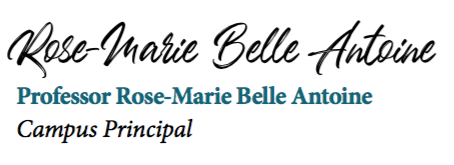The final month of 2025 draws to a close, capping a productive year for The UWI St Augustine campus. We ended November with two of the campus’s most important events: the launch of the Artificial Intelligence Innovation Centre and the three-day Principal’s Research Awards and Festival (see articles in this issue).

UWI St Augustine is working to ensure the Caribbean claims a space at the forefront of the global digital revolution. The AIIC - the region’s first and largest hub dedicated to the transformative power of AI—is invaluable to this mission.
The AIIC is not merely a research facility; it is an engine for regional growth, focusing on research, capacity building, commercialisation, and policy. I am proud of the scale this initiative has already achieved. Today, the AIIC unites over 50 dedicated members and 20+ institutional partners. With more than 35 active projects currently underway, we are proving that through innovation and strategic partnership, UWI St Augustine is making a major contribution to the future of Caribbean intelligence.
The Principal’s Research Awards and Festival are a celebration of one of the university’s fundamental purposes—the seeking of knowledge to better understand and improve life.
Along with teaching, research is the imperative of any university. A strong research culture is an asset for the development of a nation and region. In fact, research and development are important indicators of the well-being of a society. The Awards and Festival recognises the praise-worthy work of our researchers and provides funds for the award winners to continue that work. This encouragement strengthens the enabling environment for the kind of groundbreaking work that can improve the world.
Apart from encouragement and support for our researchers, the other crucial aspect of a research culture is buy-in from the society. Internationally, the countries that derive the most benefit from research are those that treat it as a strategic asset and incorporate it into their development plans. Partnership and investment with government and the private sector are priorities for this campus’s research agenda, and I am greatly encouraged by their participation in the Awards and Festival.
They generously sponsored prizes for our winners. They attended our meetings, sessions and exhibition. I was also very pleased to host a high-level meeting with leaders of the business community to discuss investment and partnership opportunities. This type of discussion is extremely productive because to best serve society, a research agenda must be a two-way conversation. We share our work, but also listen to what they need. Through listening, we can tailor new research to find solutions for their needs.
However, buy-in means more than collaboration with industry and policymakers. We purposefully invited the public to be part of the Awards and Festival to show them the value that research can bring to their lives and communities, and perhaps encourage the next generation of young scholars to make their own contributions to UWI St Augustine’s research legacy.
Speaking of legacy, the end of 2025 also brings to a close our 65th year as a campus. Our acknowledgment of this milestone continued all year, the highlight being the Staff Talent Showcase held on Founder’s Day, October 12. It was an intimate celebration of the campus community and a fitting way to acknowledge the heart of the campus, its people.
In this issue of UWI TODAY, we commemorate the 65th anniversary, and people are the theme. Over the six and one half decades, we have seen phenomenal growth, had countless successes, and enormous positive impact on Trinidad and Tobago and the region, but it all comes back to people. The legacy of UWI St Augustine was established and grew from the blueprints of the founders, the governance of its leaders, the teaching of its educators, the discoveries of its researchers, the policies and advocacy of its public intellectuals, the services of its professional and support staff, and the thousands upon thousands of graduates that have gone forth and contributed to society.
We look to them with gratitude and for guidance to help us continue that great legacy, as UWI St Augustine works to serve our region and the world.
